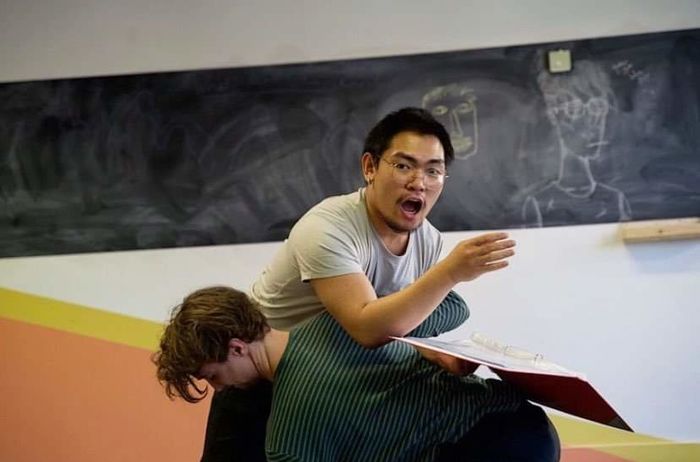M. Butterfly grows its wings
Columnist Stanley Lawson reviews M. Butterfly at the ADC Theatre

Content Note: this article contains discussion of racism
In a break with convention, this review of M. Butterfly by David Henry Hwang will start with a note from the production’s directors, Tungsten Tang and Hetty Opayinka:
‘As rehearsals for M. Butterfly progressed, both cast and crew doubted the suitability for a cisgender woman to play the role of Song Liling in 2022. The result of this has been that Charmaine Au-Young has taken the difficult decision to step down as Song and instead contribute to the production she has tirelessly worked on, as an ensemble member. Jaden Tsui will take on the role of Song Liling. We would like to stress that this was a mutual decision and not one forced upon anyone. Yet, even as we try to update this complex and heartbreaking play, we recognise that we do not have all the answers. We are reassured by the fact that our interpretation will facilitate discussion on these pertinent issues amongst our audience members.’
Naturally, a last-minute re-cast for whatever reason is always difficult, and Jaden Tsui (playing Song Liling) was holding a script on stage for much of last night’s performance. However, they carried it off impressively, still giving a sensitive and nuanced performance. The figure of Song Liling is an enigma for much of the play, containing a tension between the real person with agency and the oppressive fantasy of Song’s lover, French diplomat René Gallimard (Joe Harrington). Though the enigma is partially unravelled through Gallimard’s retelling of events, Tsui maintains an enigmatic level to the character, weaving a searing vulnerability and a hard, sardonic, edge which was compelling.
“The playing out of Gallimard’s racist male’s fantasy of having his own Madame Butterfly in Song Liling was viscerally uncomfortable”
Gallimard narrates his own story, leaving Harrington with long passages of exposition and monologuing to work with. Some of these passages were admirably executed, peppered with humour and energetic direct addressing to the audience. However, others were less engaging; especially around the mid-point of the play as the plot seemed to slow. Despite this, Harrington managed to push through this pacing issue to deliver a strong performance; at several points, the playing out of Gallimard’s racist male fantasy of having his own Madame Butterfly in Song Liling was viscerally uncomfortable. This was achieved without making the character a pantomime villain, for which Harrington deserves praise.
At the close of the play, Song, Gallimard and their story collapses in on itself in a meta-theatrical sequence. This moment—a moment of revelation for both Gallimard and Song about the fantasies they had constructed and inhabited—gave space for both Tsui’s and Harrington’s most touching moment of the production. With a sequence of Song’s back to the audience, and Gallimard facing us, Erin Tang and Hetty Opayinka’s staging tells the final moment of this story brilliantly.
“M. Butterfly is certainly a plot-centric play with a lot of text to get through which can be challenging for both directors and actors”
Though the execution of the final moments of the play was inspired, it took a long and dramatically circuitous route to arrive at it. Most plays have lulls in energy, but there was a disconcerting amount of the actors standing fairly statically on stage and delivering dialogue. M. Butterfly is certainly a plot-centric play with a lot of text to get through which can be challenging for both directors and actors, but there were points at which the pace slowed dangerously close to stopping. As with other aspects of the staging, the lighting (Emma Gibson, Vivian Wang) and the use of sound showed flashes of inspiration; the tight confines of Gallimard’s cell being shown in lighting was visually striking and worked to elevate Harrington’s performance wonderfully. However, the cast on a few occasions struggled to make themselves heard over a recording of the music from Puccini’s Madame Butterfly, which cut in and out at inexplicable intervals. Gallimard’s racist fantasy and the figure of Madame Butterfly are intimately linked in the play, but the slightly sporadic use of the music—and its distracting volume—was disorientating.
M. Butterfly is an extremely challenging play which feels remarkably relevant (I was surprised to learn after last night’s performance that David Henry Hwang wrote it in 1988); working to construct and deconstruct a male racist fantasy based on centuries of orientalism. This production tackled this responsibility head on and engaged in the gender implications of Song’s character and both Song and Gallimard’s sexuality sensitively and to great dramatic effect. Though beset by production issues and a few first night problems, the production manages to capture the delusion which is so central to the story and excavate the question of who controls a narrative.
M. Butterfly by David Henry Hwang is showing at 7:45pm in the ADC Theatre from 17th – 21st May
 News / Cambridge student numbers fall amid nationwide decline14 April 2025
News / Cambridge student numbers fall amid nationwide decline14 April 2025 News / Greenwich House occupiers miss deadline to respond to University legal action15 April 2025
News / Greenwich House occupiers miss deadline to respond to University legal action15 April 2025 Comment / The Cambridge workload prioritises quantity over quality 16 April 2025
Comment / The Cambridge workload prioritises quantity over quality 16 April 2025 Features / The TikTok college: using social media in access and outreach15 April 2025
Features / The TikTok college: using social media in access and outreach15 April 2025 Sport / Cambridge celebrate clean sweep at Boat Race 202514 April 2025
Sport / Cambridge celebrate clean sweep at Boat Race 202514 April 2025






